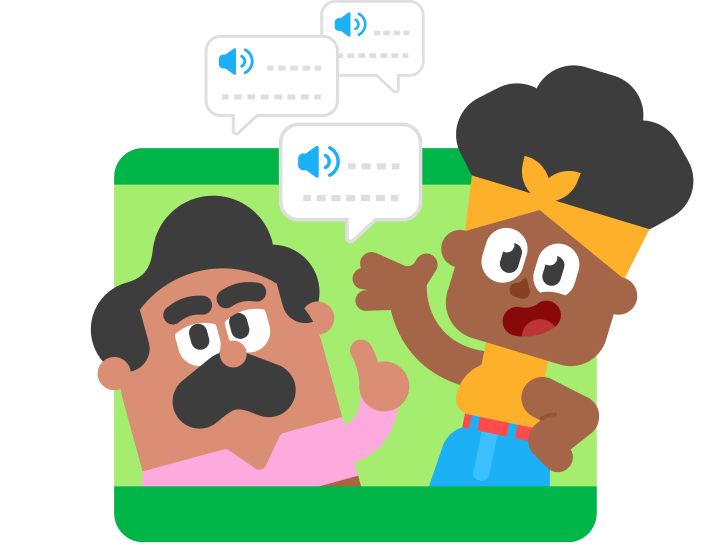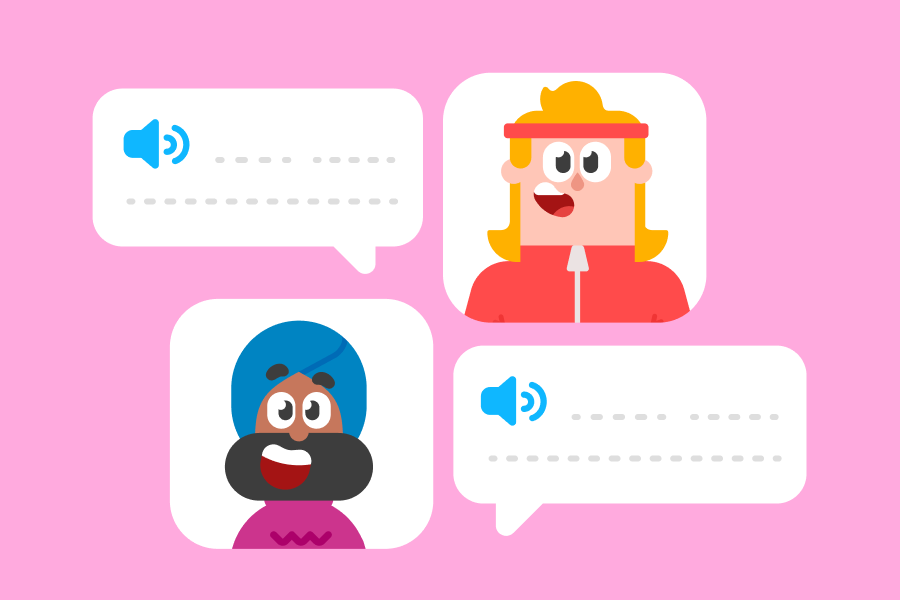One of the most common insecurities for new language learners is having an accent in their new language. Why is it so hard to learn the sounds of our new languages in the first place? The simple answer is that the answer isn’t really that simple! 😅
Everyone has an accent, even in their own language, and when we learn a new language we might start doing a lot of thinking about how we sound in that one, too. Our mouths—and brains—know a lot about the sounds of our own language, and we take all of that knowledge with us when we learn a new one. Here's why we have accents in our new languages!

Sounds 101: What we know about our own language
Languages are systematic, and as humans we are really good at learning patterns—especially in a language we have been using our whole lives! We often don’t realize how much we know about our first language, but we are already experts in all kinds of subconscious knowledge about sounds. Here are some examples of things you might not know that you know:
- Individual sounds. For example, English has a lot of words with “th,” but it’s actually a pretty uncommon sound in the world's languages! German, for example, has words that are spelled with “th”, but pronounced with “t” or “d” sounds instead.
- Rhythm and intonation. In English, it is common to make your voice go up at the end of a question, and even how long we pronounce each vowel and word is a kind of subconscious knowledge that varies according to language!
- Rules for combining sounds. What kinds of sounds can go next to each other in words is another kind of language-specific knowledge! In English, multiple consonant sounds can go together at the start of a word (think about the “s,” “k,” and “r” sounds in scratch), but many languages, such as Hawaiian, prefer to space out their consonants with vowels in between (ʻūlū is Hawaiian for “scratch”).
All of these features can be really different across languages! This amazing subconscious linguistic knowledge is what helps us use our languages quickly and efficiently to communicate.
We use this know-how for speaking and listening to our language. That’s the thing about accents: They’re a two-way street. We speak and listen with them!
Bringing old sounds to a new language
All of that information about your first language is sort of like your brain's language operating system, and you’ve been listening and speaking with that software for your whole life! When learning a new language, it’s like you have to set up a new operating system, and you naturally bring your old software (pronunciation information!) with you.
Part of an “accent” comes from bringing the sounds you know from one language to your new language. No two languages share exactly the same sounds or ways of pronouncing them, so you'll have to learn new sound rules and patterns that you've never had to pronounce before! As you gain experience with the new sounds, your language operating system will try to help you out by slipping in similar sounds from the languages you already know.
For example, many English speakers have a hard time pronouncing r’s in other languages—like the rolled "r" in Arabic or the French "r"—since English “r” is pronounced in a different part of the mouth and with different movements. When English speakers set out to learn French, they bring all of that English “r” experience with them, and may end up saying the French “r” like the English one! English speakers basically have to retrain their brain and mouth. The more they hear and say the French “r,” they build up their expertise and pronounce the “r” closer to French each time. This kind of change doesn’t happen overnight, because you have to retrain muscles that you've been moving in the same way since you started babbling as a baby!

Learning the rhythm of a new language
When learning a new language, you will also bring over the rhythm, stress, and intonation of your own language (all these together are called prosody). Those components, like going up at the end of a sentence when asking a question in English, help set the tone and provide extra information for the audience.
For example, in English, we emphasize a certain part of a word (the "stressed" syllable) and really shorten the rest of it. The English word banana is a great example of this—we emphasize the middle part of the word but speed through the first and last parts (buh-NA-nuh). Not only does word stress change the tempo of different parts of a word, but it also affects the rhythm of entire sentences in English!
This is not the case in all languages. In Italian, for example, each syllable is pronounced for about the same amount of time, even the stressed syllables, almost like the steady beat of a single drum. This can be tricky for English speakers to learn, since English rhythm works differently. But, with practice, English speakers can pick up Italian rhythm and successfully order limoncello after dinner in Campania!
Sound combination rules in a new language
Sound combination rules refer to how we can and cannot combine sounds to make words in our languages. Over years of speaking our language, sound combinations get stored as muscle memory: Our minds and mouths get used to producing the same sound combinations!
Imagine an English speaker moving their mouth to pronounce the Russian word zdravstvuite (hello), which starts with “z,” “d,” and “r” together. Since English does not have words that start with “zdr,” physically pronouncing those sounds together can feel clunky at first! An English speaker brings their biases for not combining these three sounds, even though “z,” “d,” and “r” are perfectly fine in English on their own.
This is not just true for English and Russian! Many languages don't combine consonants as freely as English or Russian (including Persian and Hawaiian), making combinations like “xths” in sixths very challenging!
Accents should be worn as a badge of honor!
Language is for connection and communication: If you’re able to communicate and build human connection (with an accent), then you’re already achieving the main goals of language!
Learning a new sound system can feel frustrating at first, and it’s common to focus on how you're pronouncing new words. But remember, accents are a symbol of so many positive things:
- Connection to culture. Speaking with an accent is a sign that you have a connection to a particular culture and community, whether it’s in your own language or a new one.
- Learning a new skill. Having an accent is a telltale sign that you are learning a new skill that will connect you with a whole new community of people, and that is something to be proud of!
- Different lived experience. A non-native accent signals that you may be from a different city or country, and this can actually be helpful: If you’re asking for directions in a new city, a perfect accent might get you a response filled with local cultural references (“You know where that old movie theater used to be? Turn down that street and walk past the park where they have summer concerts”).
- Signs of multilingualism. Accents can inform listeners that we speak multiple languages, which is no small feat!
- Increased cognitive abilities. Learning a new language has positive effects on our brains! That challenge or brain “itch” you may feel when speaking another language is actually increasing cognitive abilities like mental alertness.
Everyone has an accent, and having a non-native accent in a new language (or not so new language) is completely normal! These are just part of a long list of reasons that an accent is a positive thing! So, get out there and flex that accent!
